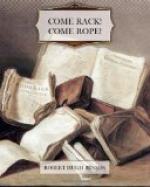“But a clever one will find it,” he said.
Mr. Thomas was heard to sigh.
III
It was on the afternoon of the following day that Marjorie rode up to her house with Janet beside her, and Hugh Owen walking by her horse.
He had finished his work at Padley an hour or two after dawn—for he worked at night when he could, and had then gone to rest. But he had been waiting for her when her horses were brought, and asked if he might walk with her; he had asked it simply and easily, saying that it might save his losing his way, and time was precious to him.
* * * * *
Marjorie felt very much interested by this lad, for he was no more than that. In appearance he was like any of his kind, with a countryman’s face, in a working-dress: she might have seen him by chance a hundred times and not known him again. But his manner was remarkable, so wholly simple and well-bred: he was courteous always, as suited his degree; but he had something of the same assurance that she had noticed so plainly in Father Campion. (He talked with a plain, Northern dialect.)
Presently she opened on that very point; for she could talk freely before Janet.
“Did you ever know Father Campion?” she asked.
“I have never spoken with him, mistress. I have heard him preach. It was that which put it in my heart to join the company.”
“You heard him preach?”
“Yes, mistress; three or four times in Essex and Hertfordshire. I heard him preach upon the young man who came to our Saviour.”
“Tell me,” she said, looking down at what she could see of his face.
“It was liker an angel than a man,” he said quietly. “I could not take my eyes off him from his first word to the last. And all were the same that were there.”
“Was he eloquent?”
“Aye; you might call it that. But I thought it to be the Spirit of God.”
“And it was then you made up your mind to join the Society?”
“There was no rest for me till I did. ’And Christ also went away sorrowful,’ were his last words. And I could not bear to think that.”
Marjorie was silent through pure sympathy. This young man spoke a language she understood better than that which some of her friends used—Mr. Babington, for instance. It was the Person of Jesus Christ that was all her religion to her; it was for this that she was devout, that she went to mass and the sacraments when she could; it was this that made Mary dear to her. Was He not her son? And, above all, it was for this that she had sacrificed Robin: she could not bear that he should not serve Him as a priest, if he might. But the other talk that she had heard sometimes—of the place of religion in politics, and the justification of this or that course of public action—well, she knew that these things must be so; yet it was not the manner of her own most intimate thought, and the language of it was not hers.




